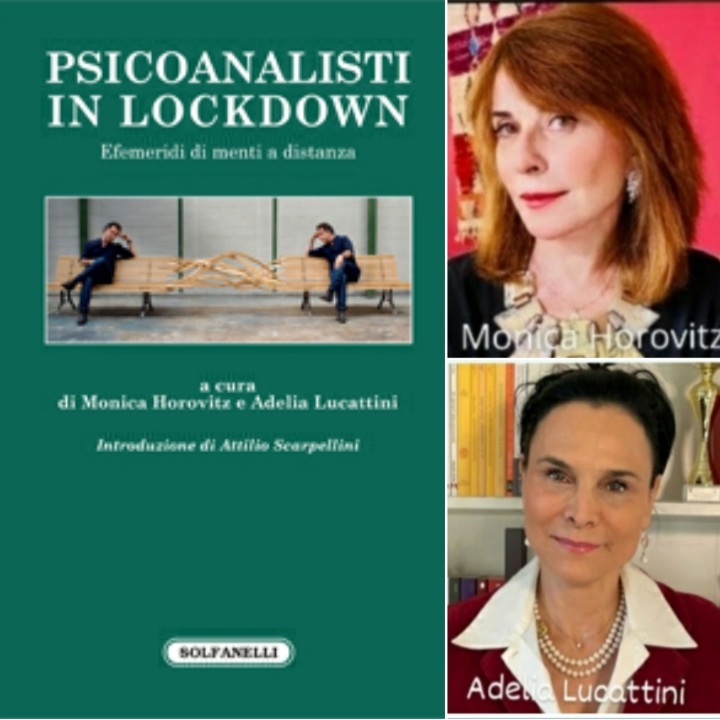 (AGENPARL) - Roma, 6 Ottobre 2022
(AGENPARL) - Roma, 6 Ottobre 2022(AGENPARL) – gio 06 ottobre 2022 IN ROME, THE PRESENTATION OF “PSYCHOANALYSTS IN LOCKDOWN” BY ADELIA LUCATTINI
WITH MONICA HOROVITZ AND ADELIA LUCATTINI
FRIDAY, OCTOBER 7, 2022
7 P.M. – BEST WESTERN PLUS HOTEL UNIVERSO – ROME
Rome, Oct. 6, 2022
The book was born from the testimonies of a group of fourteen psychoanalysts located in different countries (France, Italy, Argentina, and Lebanon), who discussed their professional activities during the March 2020 lockdown due to the Covid-19 pandemic. This is the content of the book “Psychoanalysts in Lockdown. Ephemerides of minds at a distance” (Solfanelli) that will be presented on Friday, Oct. 7, at 7 p.m., at the Best Western Plus Hotel Universo in Rome (at 5 / B Principe Amedeo Street). The meeting will feature the volume’s editors Monica Horovitz and Adelia Lucattini, publisher Marco Solfanelli and Claudio Neri.
Maria Adelaide Lupinacci will introduce the proceedings, while Annabella Cerliani will read passages from the book.
These are reflections born within the group held by Monica Horovitz at the Société Psychanalytique de Paris since 2003 and enriched by the presence of the French-Argentinian psychiatrist and psychoanalyst Janine Puget. The book is written in the form of a diary, in which the authors confront the ethical imperative of standing by their patients in a time of global danger and crisis.
“We did not start with the idea of writing a book, from the very beginning I made it clear that I was writing a ‘logbook’ to help the group members contain the anxieties caused to them by the situation of the moment,” explains Monica Horovitz, “What is interesting to read is the work of the group, the work of a group of psychoanalysts who come together with the purpose of thinking together about a new situation, one that has never happened before. The original and most profound element is given by the emergence of intimate truths that go beyond the psychoanalytic concepts themselves, which of course are there and inevitably emerge. It is not that it is a treatise on psychoanalysis, it is an essay between the intimate and the professional, the original element of the book is just that. The focal point is that while it is rich in psychoanalytic concepts, through these writings each of the authors is also talking about himself as a person and as a human being, not just as a psychoanalyst and professional. First there was the group and after this wonder. The group put their work on paper, this makes one feel that the thought and all that was shared was not lost, the efforts were not in vain. The book came through an elaboration of the initial members of the group. It is important to emphasize that when there is closure one must instead open up, that one cannot continue doing the same old things as if nothing were the case since that would in itself be a denial.”
“This book stems from the desire of Monica Horovitz and myself to make the Italian public a part of this international experience,” Adelia Lucattini continues, “It collects the testimonies of an international group of psychoanalysts, about their professional activities during the worldwide lockdown of March 2020 due to the Covid-19 pandemic. Since, the situation was quite exceptional, Monica Horovitz thought that the group could also work differently and that it was not possible to ignore what the whole world was experiencing. So, in the full belief that the seminars could be open to other psychoanalysts as well, she invited Janine Puget who connected from Buenos Aires and other psychoanalysts who were in their home countries at the time to participate. The book recounts how we dealt with that period, our work and our lives, and collects our reflections. From the pages, reworked from the initial notes, it emerges how in times of crisis and difficulty it is necessary to keep thinking and help each other using the tools that psychoanalysis puts at our disposal. With the lockdown we found ourselves having to make decisions,” Adelia Lucattini continues, “professionally whether to suspend therapies, ongoing analyses with our patients or to continue in an online mode for those who wished to do so. Even the International Psychoanalytical Association very quickly authorized the continuation of remote analysis. Some patients agreed; others waited to resume in-presence. Certainly, it was a big change, although as a clinician I was familiar with this method because of the practice done with telemedicine. We cannot say that online psychoanalysis is “the same thing” as in-presence analysis but it is possible, and the treatments are effective. This is because the analyst is the guardian and guarantor of the setting, and the focus of analysis remains the relationship with the patient. Pandemic definitely changed the way of life and thinking not only of psychoanalysts and their patients, but of people in general because it could not be ignored. This book is proof of how in any period of difficulty or crisis, it is always possible to treasure the experience, to learn something new, which can be used even after the emergency is over.”
For informations:
Marialuisa Roscino



